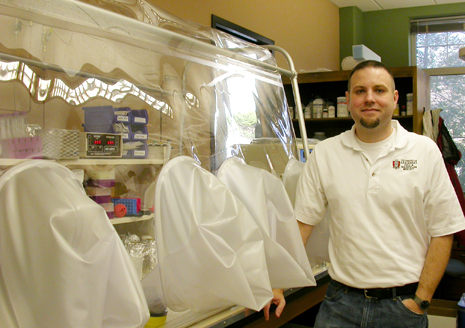Oxygen 'Sensor' May Shut Down DNA Transcription

Daniel Lessner and his colleagues have taken the first step towards showing that iron-sulfur clusters in an ancient microorganism may serve as sensors to detect oxygen, which can be fatal to the anaerobes.
FAYETTEVILLE, Ark. – A key component found in an ancient anaerobic microorganism may serve as a sensor to detect potentially fatal oxygen, a University of Arkansas researcher and his colleagues have found. This helps researchers learn more about the function of these components, called iron-sulfur clusters, which occur in different parts of cells in all living creatures.
Daniel Lessner, assistant professor of biological sciences, and his colleagues report their findings in the Journal of Biological Chemistry.
Lessner studies methanogens, ancient anaerobic microorganisms that live in extreme environments, including the human gut. In these organisms, he looks at RNA polymerase, a protein that “reads” DNA and produces RNA, which contains codes to build proteins. This process is found in most of the things we think of as “living.”
Methanogens interest space scientists because they can survive in extreme temperature conditions and in hostile environments. They interest health researchers because some species found in the human gut may influence digestion. They also interest energy producers because they are the only life form that produces methane gas. Because of this, it’s important to understand how these ancient microscopic creatures work.
The iron-sulfur clusters also are important because they exist in most life forms, including humans – in fact, you could not survive without your iron-sulfur clusters. “It is likely that life evolved at the interface of iron and sulfur minerals,” Lessner said. In some methanogens and other single-celled organisms, the protein RNA polymerase contains iron-sulfur clusters. However, these iron-sulfur clusters are not typically found in this protein, except in certain species, including methanogens.
Better understanding of the role of iron-sulfur clusters in this simple organism will help scientists understand and perhaps control production pathways in these microorganisms to produce methane gas as a biofuel.
The researchers decided to see if they could figure out why these organisms contain iron-sulfur clusters in their RNA polymerase. They found that without the clusters, a part of the protein changed its shape, which would in turn change its interactions with other parts of the protein. The clusters might serve to regulate the assembly of the parts of RNA polymerase.
The researchers believe that the iron-sulfur clusters serve as a sensor to shut down the creation of RNA from DNA in the presence of oxygen because oxygen reacts with iron-sulfur clusters to destroy them. This in turn would help the methanogen survive.
“This may be a way to conserve energy,” Lessner said. “Organisms may have retained these clusters to serve a similar role in diverse species so that organisms can respond to changes in the environment.
“This is the first step in figuring out the protein properties and seeing how it works,” he said. Next the researchers will genetically modify the protein to change the number of iron-sulfur clusters and see what happens.
This paper was made possible by a National Science Foundation grant.
Contacts
Dan Lessner, assistant professor, biological sciences
J. William Fulbright College of Arts and Sciences
479-575-2239,
dlessner@uark.edu
Melissa Blouin, director of science and research communication
University Relations
479-575-3033,
blouin@uark.edu
Headlines
PetSmart CEO J.K. Symancyk to Speak at Walton College Commencement
J.K. Symancyk is an alumnus of the Sam M. Walton College of Business and serves on the Dean’s Executive Advisory Board.
Faulkner Center, Arkansas PBS Partner to Screen Documentary 'Gospel'
The Faulkner Performing Arts Center will host a screening of Gospel, a documentary exploring the origin of Black spirituality through sermon and song, in partnership with Arkansas PBS at 7:30 p.m. Thursday, May 2.
UAPD Officers Mills and Edwards Honored With New Roles
Veterans of the U of A Police Department, Matt Mills has been promoted to assistant chief, and Crandall Edwards has been promoted to administrative captain.
Community Design Center's Greenway Urbanism Project Wins LIV Hospitality Design Award
"Greenway Urbanism" is one of six urban strategies proposed under the Framework Plan for Cherokee Village, a project that received funding through an Our Town grant from the National Endowment for the Arts.
Spring Bike Drive Refurbishes Old Bikes for New Students
All donated bikes will be given to Pedal It Forward, a local nonprofit that will refurbish your bike and return it to the U of A campus to be gifted to a student in need. Hundreds of students have already benefited.




